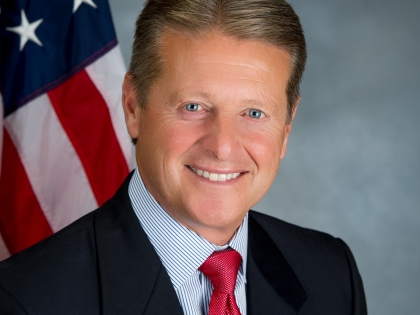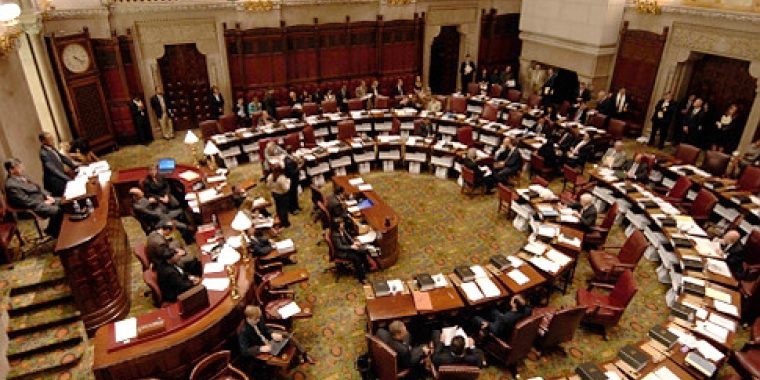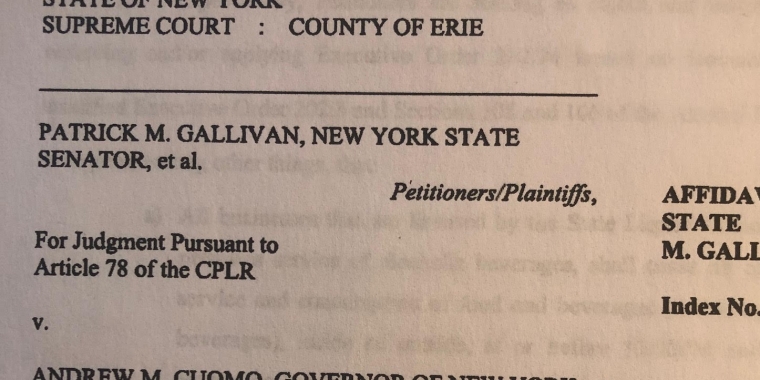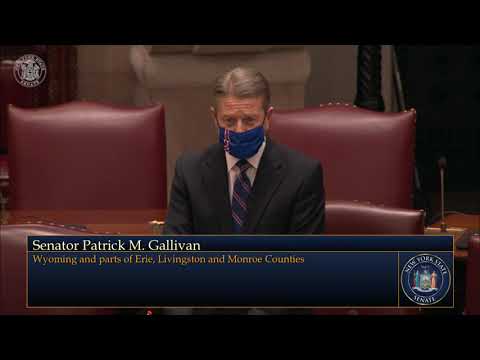
Senate Passes Bills to Fight Against Drug Abuse
Jim Ranney
April 25, 2017

Senator Patrick M. Gallivan (R-C-I, Elma) says the New York State Senate has approved eight bills aimed at tackling the heroin, opioid, and synthetic drug crisis. The measures address the evolving challenges presented by fentanyl, synthetic, and designer drugs, and help increase coordination among health care personnel to prevent future opioid overdoses and abuse. Senator Gallivan co-sponsored several of the bills.
“One of our priorities this legislative session is to tackle the state’s heroin crisis,” Gallivan said. “No community and no family is immune from the devastating impact caused by heroin and opioid abuse. These bills, combined with the $214 million secured in this year’s budget, will support law enforcement efforts to combat the spread of these drugs and enhance programs designed to keep New Yorkers healthy and safe.”
Six bills target the increased use of synthetic and “designer” drug combinations that escape criminality through loopholes in existing laws, including:
- Bill S933, co-sponsored by Senator Gallivan, adds new derivatives of fentanyl to the controlled substance schedule and increases criminal penalties for the sale of an opiate containing a fentanyl derivative. Fentanyl is a strong pain medication that is often combined with anesthesia to prevent surgery-related pain. However, it is increasingly being mixed with heroin and other drugs to produce a cheaper and more lethal product.
- Bill S816, co-sponsored by Senator Gallivan, designates Alpha-PVP, also known as “Flakka” or “Gravel” as a controlled substance. Similar to bath salts and methamphetamine, use of this designer drug has been known to cause violent behavior, with side effects including nausea, vomiting, paranoia, hallucinations, delusions, suicidal thoughts, seizures, chest pains, and increased blood pressure and heart rate.
- Bill S3518, co-sponsored by Senator Gallivan, classifies synthetic marijuana like K2, Spike 99, Spice, Yucatan Fire, Genie, Zohai and many others, as Schedule I controlled substances. These legal herb-like products are laced with a synthetic cannabinoid to produce a high similar to existing controlled substances, but with more dangerous side effects. Not only does the bill provide for the imposition of criminal sanctions on synthetic pot, but also makes it a felony to sell such products to a minor or on school grounds.
- Bill S2722, co-sponsored by Senator Gallivan, bans the analog substances of scheduled controlled substances. By expanding the state’s ability to ban analog substances, state drug and law enforcement agencies are given another tool to combat the quickly moving world of designer drugs that simply “tweak” an existing scheduled substance in order to avoid criminal prohibitions.
- Bill S658, co-sponsored by Senator Gallivan, adds a new synthetic opiate, U-47700 and commonly referred to as "Pink" to the schedule I opiate list. This inexpensive drug has spread in popularity across the United States and is reportedly eight times more powerful than heroin.
- Bill S300, would designate Xylazine as a controlled substance due to recent instances of this veterinary drug being used to lace heroin. It has emerged as a new threat in the state's battle against the heroin epidemic because the heroin-Xylazine combination is so potent that it can take multiple doses of naloxone to revive an overdose victim, and even this regime is not guaranteed to be effective. Dealers are using this dangerous drug to “enhance” their products, but risks include a dangerous depression of the central nervous system, causing individuals to drift in and out of consciousness, as well as negatively affecting heart function.
Two other measures passed by the Senate will help promote information sharing to prevent the abuse of prescription and other drugs, among other benefits of health care coordination. They include:
- Bill S2639 requires hospital and emergency room physicians to notify a patient's prescriber when a patient is being treated for a controlled substance overdose. The measure enhances the effectiveness of the Prescription Monitoring Program (PMP) Registry when prescribing controlled substances by ensuring that vital medical information is shared among health care practitioners. The bill requires an emergency room or hospital practitioner treating a patient with an opioid overdose to consult the PMP registry and notify the patient's prescriber of the overdose. Without such notification of the overdose, it is very possible that the prescriber/practitioner would not know that the patient had suffered an overdose of the opioid.
- Bill S2248 helps facilitate the exchange of health care information with hospitals, office-based surgery practices, and health care providers who accept walk-in patients not regularly seen by the provider. These practitioners would utilize and maintain an electronic health records system that connects to the local regional health information organization, aiding in the prevention of drug abuse by giving these clinics and urgent care centers the ability to see patient records and whether there is a history of drug use or prescriptions. Additionally, these clinics would add details of the visit to the patient’s records for any future medical treatment, thereby ensuring the patient receives appropriate care.
-30-
related legislation
Share this Article or Press Release
Newsroom
Go to NewsroomSenator Gallivan's Votes for Week of January 25, 2021
January 27, 2021


Senator Gallivan's Votes for Week of January 18, 2021
January 19, 2021

